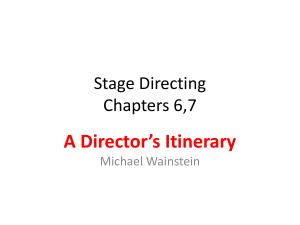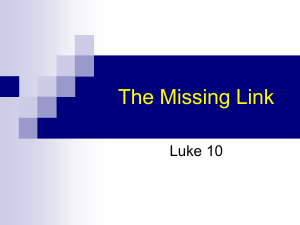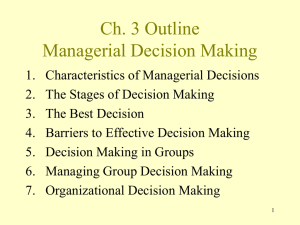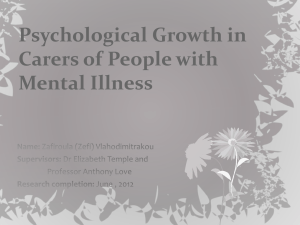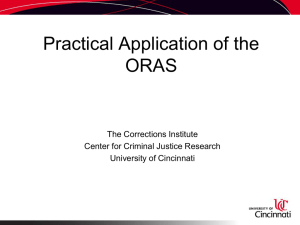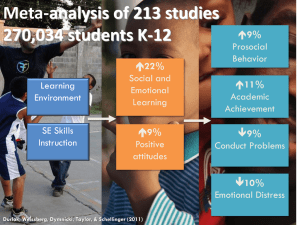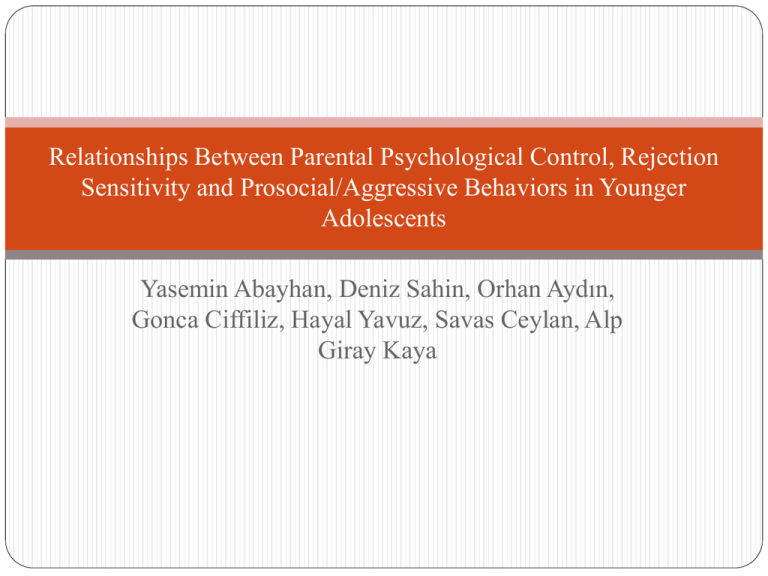
Relationships Between Parental Psychological Control, Rejection
Sensitivity and Prosocial/Aggressive Behaviors in Younger
Adolescents
Yasemin Abayhan, Deniz Sahin, Orhan Aydın,
Gonca Ciffiliz, Hayal Yavuz, Savas Ceylan, Alp
Giray Kaya
Literature Review
Recent research suggests that some parenting behaviors such
as support and control are related to adolescent’s positive and
negative developmental outcomes (Been, Barber and Crane,
2006; Kerr and Statin, 2000).
Parental support includes parental behaviors representing a
well-established positive dimension of parenting.
Parental controlling can be conceptualized as covering both
negative and positive parenting dimensions.
Literature Review
Types of parent’s control attempts such as to control the
child’s behavior versus to control the child’s self might have
positive and negative consequences.
Barber (1996) argues:
“Parental control” has to be separated by two control types
such as
“Psychological Control” and “Behavioral Control”
Literature Review
Behavioral Control
Parental behaviors of monitoring and regulating adolescents’
behavior.
Providing structure on their functioning (Steiner, 2005).
Literature Review
Psychological Control
Intrusive parental practices to the adolescents’ autonomy.
Manipulating their psychological and emotional worlds.
Utilizing emotional strategies to control adolescents’
behaviors.
Hindering their self expressions.
Parents control the adolescent’s inner state (Steiner, 2005).
Literature Review
Parents’ use of psychological control are most strongly
related to negative developmental outcomes such as;
Low self-esteem
Low self-confidence
Low academic achievement
Identity development (Barber and Buehler, 1996; Barber and
Harmon, 2002).
Literature Review
As Steinberg (1990) stated, healthy adolescent development is
associated with higher levels of behavioral control but lower
levels of pscyhological control.
In pscyhological control parents are using emotional strategies
in order to control adolescents’ behaviors.
Therefore, they can induct the feeling of guilt or they can ignore
and minimize the warmth and compassion behaviors which can be
associated with the term of “rejection sensitivity”.
Literature Review
What is Rejection Sensitivity?
People have a tendency to avoid rejection in daily life.
Some people interpret the ambiguous negative cues as a
rejection and start anxiously expect rejection and
overreact to rejection (Downey et al, 2004; Romero-Canyas
& Downey, 2005; Pietrzak, Downey & Ayduk, 2005).
Literature Review
Rejection Sensitivity—> “cognitive-affective processing
dynamic or disposition to anxiously expect, readily perceive
and react in an exaggerated manner to cues of rejection in
the behavior of others” (Downey & Feldman, 1996).
Expectations of rejection facilitate subjective perceptions of
rejection, which cause behaviors that evoke objective
rejections, reinforcing expectations of rejection.
Literature Review
RS stems from early experiences of both parental and
peer rejection (Downey & Feldman, 1996; Pietrzak,
Downey & Ayduk, 2005).
Early parental rejections which include cruelty, hostility,
physical and emotional neglect and abuse are internalized by
children as a legacy of rejection (Feldman &Downey, 1994).
Literature Review
Psychological control could be perceived as associated with
parental rejection it may be related with rejection
sensitivity.
Socially excluded people either act prosocially in order to
gain acceptance or act aggressively regain control. As a
negative developmental outcomes of pscyhological control,
adolescents’ can use aggression and/or prosocial behavior as
a cooping strategies of both rejection sensitiviy and
psychological control.
The Aim of the Current Study
Therefore, the current study aims to answer three questions;
1- Does psychological control predicts rejection sensitivity?
2- Does psychological control and rejection sensitivity predict
both aggressive and prosocial behaviors of adolescents?
3- Does pscyhological control and rejection sensitivity predict
both aggressive and prosocial behaviors of adolescents according
to their sex?
Method
Participants were 297( 147F, 150M) students from 6th
(96=58F, 38M) 7th (73=31F, 42M) and 8th(128=58F, 70M)
grades from a state junior high school.
Method
Instruments
Parental Psychological Control Scales Maternal and
paternal 8-item psychological control scales with a 4point response rate, developed by Barber (1996) and
adapted to Turkish by Sayıl and Kındap (2010) were
used. Cronbach Alpha coefficients for the Turkish
version of the mother form is .89 and the father form is
.79.
Method
Instruments
Children’s Rejection Sensitivity Questionnaire (CRSQ):
CRSQ developed by Downey, Lebolt, Rincon and Freitas
(1998) and adapted to Turkish by Abayhan, Sahin,Yavuz,
Aydın and Giray (2008) was used. It is a 12 item scale with a
6-point response rate. Cronbach Alpha coefficients for the
anxiety expectation and anger expectation dimensions of the
Turkish version are .89 and .79 respectively.
Method
Instruments
Aggressive and Prosocial Behavior Questionnaire developed
by Boxer, Tisak, Goldstein (2004) and adapted to Turkish by
Bayraktar, Kındap, Kumru, Sayıl (under revision) was used. It is 25
item scale with a 4-point response rate. Aggressive behavior
dimension consists of 10 items. Prosocial behavior is consisted of
altruistic, proactive and reactive prosocial behavior dimensions.
Cronbach Alpha’s of the Turkish version are .90 for the aggressive
behavior, .75 for the altruistic, .84 for the proactive and .78 for
the reactive prosocial behavior dimensions.
Method
Procedure
-Participants filled out the questionnaires during class time.
-Average administration lasted for 30 minutes.
Results
A series of hierarchic analyses were performed to explore the
predictive abilities of the parental psychological control
variable and the anxiety expectation and anger
expectation dimensions of the rejection sensitivity
variable on aggressive and prosocial behaviors of younger
adolescents
Research Questions- 1
Does pscyhological control predicts rejection
sensitivity?
PredictedVariables: Anger expectations and anxiety
expectations
Predictor: Maternal and paternal psychological control
Predicted Variable: Anxiety Expectation
Anxiety expectation dimension scores of the rejection
sensitivity were first regressed on
maternal psychological control scores
and then on the
paternal psychological control scores
Predicted Variable: Anxiety Expectation
Multiple R was found to be significant in the first model
[R=.152, R(sqchange)=.023, F(1, 295) =6.932, p<.009].
The increment in the second model was also found to be
significant [R=.201, R(sqchange)=.018, F(1, 294)=5.365,
p<.021).
Predicted Variable: Anxiety Expectation
Examination of the β’s indicated that both maternal and
paternal psychological controls were significant predictors
of anxiety expectation (β=.152, p<.009 and β=.169,
p<.021 respectively )
Predicted Variable: Anger Expectation
Anger expectation dimension scores of the rejection sensitivity
were first regressed on
maternal psychological control scores
and then on the
paternal psychological control scores
Predicted Variable: Anger Expectation
Multiple R was found to be significant in the first model
[R=.174, R(sqchange)=.030, F(1, 295) =9.23, p<.003].
The increment in the second model was also found to be
significant [R=.245, R(sqchange)=.030, F(1, 294)=9.278,
p<.003).
Predicted Variable: Anger Expectation
Examination of the β’s indicated that both maternal and
paternal psychological controls were significant predictors
of anger expectation (β=.174, p<.0093 and β=.221,
p<.030 respectively )
Prediction of Rejection Sensitivity
Dimensions in Girls
Neither maternal nor paternal control predicted none of
the rejection sensitivity dimensions in girls.
Prediction of Anxiety Expectation in
Boys
Maternal control had a significant predictive power [R=.231,
R(sqchange)=.053, F(1, 148) =8.38, p<.004;
β=.231,p<.004 ].
Paternal control also had a significant predictive power
(R=.287, R(sqchange)=.029, F(1, 148) =4.607, p<.033;
β=.219,p<.033 ].
Prediction of Anger Expectation in Boys
Maternal control had a significant predictive power
[R=.220, R(sqchange)=.048, F(1, 148) =7.521, p<.007;
β=.220,p<.007 ].
Paternal control also had a significant predictive power
(R=.287, R(sqchange)=.029, F(1, 148) =4.607, p<.033;
β=.216,p<.037 ].
Research Questions- 2 and 3
Does psychological control and rejection sensitivity predict
both aggressive and prosocial behaviors of adolescents?
Does pscyhological control and rejection sensitivity predict
both aggressive ann prosocial behaviors of adolescents
according to their sex?
PredictedVariables: Agression and Prosocial Behaviors
Predictors: Maternal and paternal psychological control;
rejection sensitivity (anger expectations and anxiety expectations)
Predicted Variable: Aggression
In those analyses aggression was first regressed on
maternal and paternal psychological control scores
and then on the
anxiety and anger expectations dimensions of
rejection sensitivity scores.
Predicted Variable: Aggression
Multiple R was found to be significant in the first model
[R=.238, R(sqchange)=.057, F(2, 294) =8.859, p<.000].
The increment in the second model was also found to be
significant [R=.318, R(sqchange)=.044, F(2, 292)=7.161,
p<.001).
Predicted Variable: Aggression
Examination of the β’s indicated that while maternal
psychological control was a significant predictor of
aggression (β=.178,p<.015) paternal psychological control
was not.
Anger expectation dimension of the rejection sensitivity was
a significant predictor of aggression with a higher β (.273,
<.005) where as anxiety expectation did not.
Predicted Variable: Aggression in Girls
Multiple R was found to be significant in the first model
[R=.223, R(sqchange)=.050, F(2, 144) =3.777, p<.025].
The increment in the second model was also found to be
significant [R=.383, R(sqchange)=.097 F(2, 142)=8.038,
p<.000).
Predicted Variable: Aggression in Girls
Examination of the β’s indicated that neither maternal nor
paternal psychological control was a significant predictor of
aggression (β=.178,p<.015).
Anger expectation dimension of the rejection sensitivity was
a significant predictor of aggression with a high β (.426,
<.001).
Predicted Variable: Aggression in Boys
Multiple R was found to be significant in the first model
[R=.239, R(sq)=.057, F(2, 147) =4.455, p<.013].
But the increment in the second model was not significant.
Examination of the β’s revealed that maternal psychological
control predicted aggression in boys (β=.248, p<.018).
Predicted Variable: Prosocial Behavior
Prosocial behavior scores were first regressed on
maternal and paternal psychological control scores
and then on the
anxiety and anger expectations dimensions of
rejection sensitivity scores.
Predicted Variable: Prosocial Behavior
Multiple R was not significant in the first model; hence
paternal psychological control had no
significant predictive power on prosocial
behavior.
The second model, had a significant predictive power on
prosocial behavior (R= .239, R(sqchange)=.057
F(2,292)=.001).
Predicted Variable: Prosocial Behavior
Both dimensions of rejection sensitivity predicted
significantly:
while anxiety expectation (β=.32,p<.001) predicted
positively;
anger expectation predicted negatively (β= .377,p<.001).
Predicted Variable Prosocial Behavior
in Girls
Multiple R was significant only on the second
model(R=.306, R(sqchange)=.081, F(2,142)=6.36,
p<.002).
Predicted Variable: Prosocial Behavior
in Girls
While anxiety expectation (β=.433,p<.001) predicted
prosocial behavior positively;
anger expectation predicted negatively (β= -
.434,p<.001).
Predicted Variable: Prosocial Behavior
in Boys
Neither parental psychological control nor rejection of
sensitivity had predictive power on the prosocial behavior of
the boys.
Discussion
Results indicated that both maternal and paternal psychological
controls predicted both anger and anxiety expectations.
These results shows us that psychological control predicts both
dimensions of rejection sensitivity in general.
But renewing of the analysis according to sex differences showed
that neither maternal nor paternal control predicted none of the
rejection sensitivity dimensions in girl. On the other hand, both
paternal and maternal control predicted boy’s anger and anxiety
expectations. The perception differences between boys and girls
can be one of the explanations for these interesting results. Also
Sayıl and Kındap (2010) found that boys are much more sensitive
to paternal psychological control than girls.
Discussion
Results also indicated that maternal psychological control and
anger expectations of adolescents predicted aggressive behaviors
in general.
According to sex differences, anger expectations was only
significant predictor for girls’ aggressive behaviors.
On the other hand, boys’ aggressive behaviors was predicted by
their mothers psychological control but none of the predictors
predicted their prosocial behavior. We can assume that, mothers
are using psychological control as a preventive strategies for their
sons.
Discussion
Interestingly, prosocial behaviors were only predicted by
anxiety and anger expectations of adolescents.
However, anxiety expectations of adolescents predicted
prosocial behavior positively; whereas anxiety expectations of
adolescents predicted prosocial behavior negatively. These
result are consistent with research which are summarized
that socially excluded people act prosocially in order to gain
acceptance (Maner, DeWall, Baumeister, Schaller, 2007).

